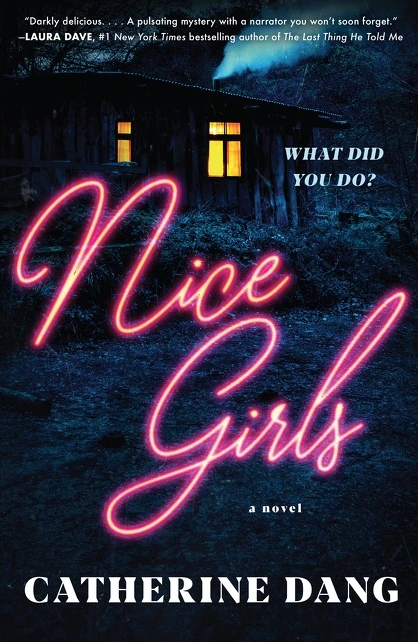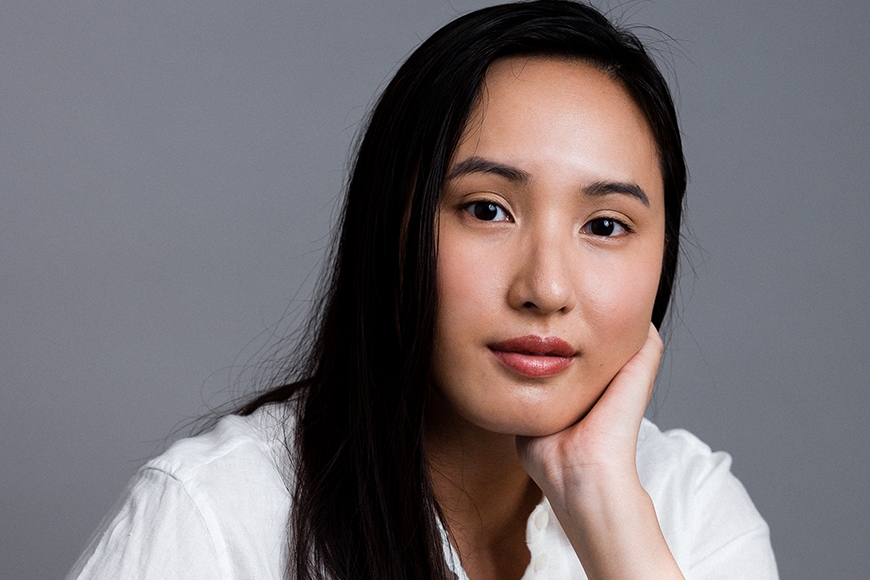Not So Nice: Alum Sets a Crime Novel in Suburban Minnesota
Growing up in a Minneapolis suburb, Catherine Dang (BA 2017) watched a lot of crime shows, most of which, whether fictional or true story, seemed to revolve around missing women. “Just once, I wanted to see a very normal, scared woman with a fighting chance,” she notes. Long interested in fiction, Dang had taken a screenwriting class at the U, as well as minoring in creative writing (and Asian American studies). She also served as Editor in Chief for The Tower literary arts magazine. A few months after graduation, Dang started penning a crime novel, set in a Minneapolis suburb. “I always thought that Minnesota had the potential to be a spooky environment.”
The resulting book, about a young woman who returns home only to get involved in a missing person case, sold to HarperCollins in 2020. Published mid-September, Nice Girls was celebrated as a “must-read” by Entertainment Weekly and reviewed favorably by The New York Times. We interviewed Dang over email.
What was the genesis of the story?
I was so enthusiastic after graduation as if I had the whole world in front of me. But I was curious about how things could have turned out differently. How would it feel to get kicked out of college? What if someone had made it to the very top of the American college system—the Ivy League—and had it taken away from them? It seemed so brutal. And compelling. That idea gave me the basis for my protagonist, Mary.
Mary shows herself to be mean, sneaky, and self-hating: What are the freedoms of writing a not-necessarily sympathetic protagonist?
I think it’s cathartic. Right now, literature is full of the unlikeable female protagonist, especially in the mystery and thriller genres. Women are talking about a lot of painful, brutal experiences that maybe weren’t acceptable to share a couple decades ago.
I believe that everyone has the same capacity for violence. After all, the most violent non-military institution is the family. For men, physical violence is almost revered. It’s viewed as masculine, heroic. Women are highly discouraged from acting out physically, so we enact our violence in other ways. We gossip, we sabotage, we cut with our words. But I really wanted to explore the whole scope of violence in women, and how it always finds its way out, somehow.
In writing Mary, I wanted her cruelty and her edges to have meaning. She wasn’t born snarky. Her personality comes from a very insecure, lonely place, and I wanted to make sure that everything tied back to that core of her. There is a reason for her behavior.

How did you write Nice Girls? How has the manuscript changed over time?
In the beginning, I knew that I wanted to write about a social media star’s disappearance in Minnesota. I knew my protagonist was a young woman. I knew the very last scene of the book, and I knew the climax. They were the loose bones of a story. But I needed a skeleton. I wrote chronologically as often as I could. I had a visual map, a calendar, and charts to keep track of everyone and everything in the story.
I did big revisions for both my agent and my editor. Nothing significant was changed, but my editor, Emily, wanted me to dig deeper into character motivations. It was a grueling process, but the book is so much better for it. Then I learned how to truly kill my darlings. I cut out entire chapters and chunks of exposition. I learned how to make everything count.
You show suburban Liberty Lake as a place with BIPOC residents, unlike many an all-white crime novel setting, as well as problematic police relationships with those communities of color. You also feature a white protagonist who holds biases about Black people and neighborhoods.
I grew up in a north metro suburb. It was a very diverse place. I went to a white Catholic elementary school, then switched to a minority-majority high school. Both experiences were eye-opening. Wherever I went, I felt like an outsider. And I guess to fit in, I learned to observe people. Everyone’s the main character in their own lives, so I’ve always been curious about the narratives around me.
I could’ve written Mary as a color-blind, heroic White Savior—I think those stories are popular for a reason. But the character would’ve felt hollow and untrue. I couldn’t just pretend that there was no race or social biases at play. These things are real, and they’re ugly, and they’re uncomfortable. And as a writer, I feel drawn toward that discomfort. I don’t have any great answers for the state of the world, but I do want to document it at least.
There aren’t a lot of nice girls in Nice Girls, but the narrative seems to suggest that (Minnesota) niceness is not a particularly healthy attribute. Is that a fair reading?
I never planned to make the book explicitly about “niceness” and women. But I did want to write about a young woman who felt stifled. Society expects so much restraint from us, in the ways we talk and act and carry ourselves. Any deviation from that restraint is seen as vulgar. So we’re scared to negotiate for higher pay, or to speak up for ourselves. We bend over backwards to make sure we’re seen as caring, compliant, non-threatening. And I think women are so resilient that they’ll keep bending over until they snap.
In the workplace, I noticed something strange about my male coworkers. They could state their opinions, and they could be loud. They were never apologetic about taking up someone’s time. They had no concerns about the people in their periphery, for what those people would feel or how they would react. They were solely focused on their work. And I guess I was frustrated. As someone who played “nice” for most of her life, I never realized how much emotional labor it took. In the office, it was exhausting to carry that emotional labor on top of my actual work. It was a bitter moment to realize that there were people who simply existed without that extra burden. I suppose these frustrations poured out into the book.
When and how did you realize you wanted a writing career? Any advice for students interested in writing fiction?
I was a pragmatic kid. I knew my family didn’t have much money, so I convinced myself that writing was a bad dream, about as realistic as singing or acting. But I still wrote short stories anyway. It felt like a dirty secret. Then I studied English in college. I finished writing a whole screenplay. I realized I could tell a coherent story from start to finish. I knew my prose was decent.
After graduation, I felt free. I had never taken a big risk before in my life, so I thought I would take the plunge. Otherwise, I was afraid I would never write. I then got a day job in law. I hated every moment at that job, but it made me desperate enough to finish my book.
Everyone has an idea for a book. But few people sit down to write it. Fewer people finish, and fewer of those get an agent. Even fewer get a book deal. And only a handful become Stephen King or J. K. Rowling. Publishing is hard. It’s not a meritocracy. A lot of it is based on luck, marketing, and networking. The only thing you can control is your own work ethic. That motivation and that discipline to tell a story—it’s got to come from within.
What was the most useful thing you learned as an English major?
I learned how to effectively argue. A huge chunk of the English major is learning how to build an argument, how to persuade, and how to anticipate counter-arguments. Beyond the persuasive essay, this is such a useful skill in life. I’ve used these skills with outwitting awful landlords, negotiating pay, and even crafting storylines.
What do you most appreciate about your time at the University of Minnesota?
Well, I’m really glad I took those creative writing classes! I was always shy about my writing, and I was terrified of criticism. But the feedback sessions were useful. I learned about the weak spots in my writing, and I kept those things in mind as I worked on the book.
I really liked my dramatic literature courses with Professor Josephine Lee. I liked working on The Tower magazine with Senior Lecturer Jim Cihlar, and I really enjoyed my screenwriting course with Lecturer Miriam Queensen.
Best book(s) you’ve read recently?
Circe by Madeline Miller. I’m late to the party, but it is so, so good.



